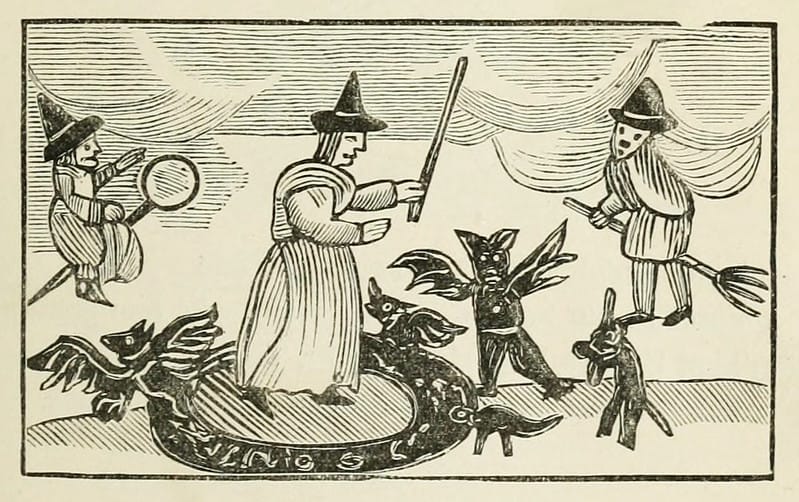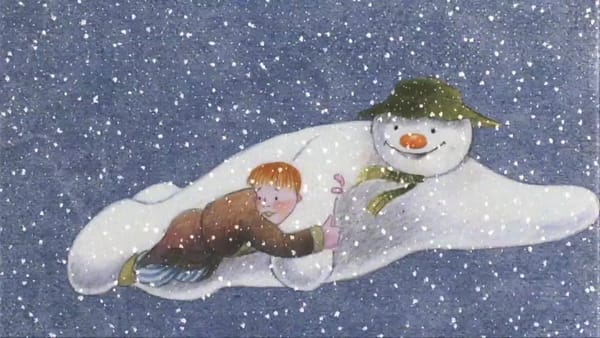Note 76: Hunting (and publishing) AI demons
Let's see just how well my AI-story detecting radar is working these days!

My day job is that of an independent software developer, primarily working with research institutions and start-ups to build novel systems that aren't available for purchase off-the-shelf. That involves a lot of work in emerging area, which has included large language models (LLMs), reinforcement learners (RLs), and automated dialog systems. For a decent glimpse of what that looks like, check out my post on the automated and human-augmented system I created for moderating AI content in conversational contexts.
In the evenings and weekends, I moonlight as a writer and a publisher for Weird Fiction Quarterly, a three year-old anthology series where we publish 500-word weird fiction stories and poems, centered on a theme chosen for each issue. (Our latest release contains 60 contributions related to the theme of Robert W. Chambers' The King in Yellow.)
WFQ is the home of my first published fiction, when my pal Russell Smeaton started the series, and - almost a year in - handed it over to Sarah Walker and me to continue when the demands of producing a quarterly publication were no longer compatible with his daily life and responsibilities. Including Sarah and myself, we now have a team of five who both write for the series and curate it. We're currently in the middle of reading through stories for our next issue, on the theme of weird AI.
Earlier today, my buddy Ted shared a post where author Mark Lawrence decided to repeat an experiment he tried a few years ago, and he pitted ChatGPT against human authors in the task of writing flash fiction about demons. In addition to my WFQ work, I recently sold a longer short story on that theme, so the servants and occupants of Hell have taken up more space in my mind lately than is probably healthy.
With all that in mind, I decided to take the stories that Lawrence gathered and treat them as blind submissions to the WFQ curation process. When we read new submissions, we typically have four outcomes:
- Accept the story as-is, with maybe some minor editing for stylistic consistency.
- Accept the story, but request some structural revisions to be made before we can publish it.
- Accept the story as having a spark of something interesting in it, but have an editor work with the author to rewrite the story to pull that spark out.
- Reject the story, but invite the author to submit something else that might be a better fit for the issue's theme.
In addition to evaluating the story as it is on its own, we also look for variety and creative takes on the theme that make each issue an eclectic and interesting reading experience, ideally with something for everyone. I'll be relaxing that requirement for my evaluation of these stories, but it's always something we keep in mind.
So, how did Lawrence's stories stack up as potential entries in a WFQ issue on demons? Let's see!
Story 1: This story is on the border of outright rejection and working with the author to try and rewrite it into something we'd publish. I strongly suspect that this story is AI due to the inconsistency the river moving too fast to freeze and the kids drowning who venture on the ice covering it. (This is something we'd fix in our editing pass.) Furthermore, the story just isn't that interesting, and doesn't really make sense as a demon story as opposed to some other form of monster. (A werewolf might make more sense, perhaps?)
Verdict: Reject.
Story 2: This is one of those stories that I grew to appreciate the further I read. The way it starts out, I thought that it was AI, but there's a scatological consistency to it that I just don't see an AI maintaining. It draws a sharp contrast between the angel and demon, and actually says something about the nature of demons by the end.
Verdict: Accept, with some minor editing.
Story 3: This was my favorite story of the bunch and I feel like I'm reading a heavy metal album cover as I went through it. It's a great sword and sorcery tale. I have a hard time imagining an AI being able to write the dialog and internal pace that makes this story thump.
Verdict: Accept, as-is.
Story 4: Solid demon story with an underlying theme as the backbone. I'm skeptical that an AI wrote this - the structure suggests that this was crafted, not stochastically assembled.
Verdict: Accept, with some minor editing.
Story 5: This story is all over the place, and there's a lot her that doesn't make sense for a demon (licking the condensation off of the bus stop?). I would expect a human author to write a bit more detail about what led the narrator to this place, instead of generic exhaustion. When it comes to structure and crafting, this is the inverse of Story 4 for me, and I strongly suspect that this is AI.
Verdict: Reject.
Story 6: I loved the humor in this one and the tongue-in-cheek take on possession. I strongly doubt that it is AI and could see this working well in an issue of WFQ.
Verdict: Accept, with some minor editing.
Story 7: This may be the toughest story of the bunch. There are some weird inconsistencies in it that make me suspect it's AI. (Primarily, the size of the demon - is it teapot sized, or big enough to balance a biscuit on its nose?) The whimsy of the story works better as a faerie story, BUT the final line - "... the most civilized encounter with Hell he would ever endure." - suggests an element of human guile indicating that randomness in the story is intentional. That said, if held at gunpoint and forced to make a judgement, I would say that this is AI generated. Very good AI - much better than its suspected AI predecessors - but AI nonetheless.
Verdict: Accept, but with some structural changes to tighten up the story and eliminate inconsistencies.
Story 8: This story wastes a good amount of space on stuff that isn't relevant for the overall story, such as the Evory character. There's a fun story in it about a sleepover gone wrong, but it's all over the place. There's also a lot of inconsistency with demonic lore just doesn't make sense - silver knives, iron nets, but no Latin Bible with its in nomine patris? I strongly suspect that this is AI and we would reject it for that reason - a human isn't going to prompt-engineer this into a good story - BUT if we knew that this was a human-written story...
Verdict: Accept, but with major changes and restructuring made with one of our editors.
So, there are my verdicts as one of five WFQ editors who would be reading these from the submission pile. Please be patient as I review the rest of Lawrence's experiment and see whether my AI Radar is as good as I think it is...
... and we're back! Let's see how well I did.
Story 1: I had it as AI and would reject it.
This story was actually written by Janny Wurts.
Story 2: I had it as human-authored and would publish it.
This story was written by Miles Cameron.
Story 3: My favorite of the bunch and I would publish in a heartbeat.
This story was written by AI.
Story 4: I had it as human-authored, and would accept it.
This story was written by AI.
Story 5: I had this as AI and would reject it.
This story was written by AI.
Story 6: I had this as human-authored and would publish it.
This story was written by the experimenter, Mark Lawrence.
Story 7: I had this written as AI, but if I had proof that a human wrote it, I'd publish it if they worked with one of our editors to further forge it into shape.
This story was written by AI.
Story 8: I had this pegged as AI, but if I had proof that a human wrote it, I'd publish it if they worked extensively with one of our editors to further forge it into shape.
This story was written by Robin Hobb.
I attributed two stories to AI (#1 and #8) that were actually human-authored, and I would have been fooled by an AI twice (#3 and #4). I successfully detected humans twice (#2 and #6). And I successfully detected AIs twice (#5 and #7).
Note that an implicit assumption that I had was that all the human writers would produce something worth publishing in WFQ, and I suspect that was part of me attributing Stories #1 and #8 to AI when the human effort just didn't resonate with me. (It happens.) I'm not all that familiar with Wurts and Hobb, but a brief look at their online presences suggests works grounded more in high/epic fantasy genre than the weird/horror lens I'm reading these through. I can see some of my complaints about those stories emerging out both challenges transitioning to much smaller lengths than they typically publish, as well as switching gears from high to low fantasy.
Stories #3 and #4 were the most interesting, as these were my false-positives. Maybe I haven't read enough sword and sorcery lately - and #3 (the priest fighting the demon with a sword in church) is pretty cliché - but I really liked it. I thought that #4 was fairly (Clive) Barkeresque, and that there was an intentionality to the malignant lust that oozes out of it. It reminded me a good deal of R. Scott Bakker's grimdark work, and perhaps there's enough of that in the training corpus for it to use to pass muster. Maybe one of my co-curators would have tagged one of these as AI with something I missed?
Overall, a very solid showing for ChatGPT - much stronger than I expected. That said, it does look like Lawrence did do some prompt engineering for some of these ("for the AI there were additional very brief suggestions concerning tone &/or setting to generate variety", "I have prompted the AI to use rude words, em-dashes and such on occasion in some of the pieces."), and it would be interesting to see the exact revision history for the AI stories to see what extent the elements that fooled me emerged on their own from ChatGPT, or whether some human intentionality seeped into the story through the prompt (esp. on #4).
Overall, this was a fun experiment and a decent illustration of how far large language models have come as writers themselves. That said, we have no plans to stop working with humans and transition WFQ into an AI publication. We have a strict NO AI policy in place at WFQ for a couple of reasons:
- The authors whose work was used as statistical fodder for these stories were likely not compensated for their work and that is wrong.
- AI-generated works do not enjoy copyright protection. (The human-authored prompts are protectable, the output less so.)
- We like spending our time and effort as editors and publishers nurturing and supporting human authors. OpenAI and its ilk can afford to pay humans to coach its models if it feels that's a priority.
Now, one of the challenges this experiment highlights is the difficulty for human readers to distinguish between human- and machine-authored content. WFQ has (mostly) a closed submission process for this reason - we hear too many horror stories about slush piles being flooded with low-effort AI submissions that drowns out the human voices seeking an audience. Existing members of our contributor community can suggest new people to add, or established authors can reach out to us about becoming a part of the community. (If any of the contributors to Lawrence's experiment would like to join us, e-mail atchris@weirdfictionquarterly.com.)
We recognize that this creates barriers to brand new writers who are seeking to join our community, and that reflects the general carnage that AI is causing in entry-level positions of all kinds. But this is the world that we live in. I was lucky as a green writer (with writerly connections) to start telling stories right before AI blew up the publishing.
That said, a word of advice to new folks: keep writing and be persistent. The barrier to entry may be higher than it used to be, but you can still break into places like WFQ if you're open to constructive criticism, don't behave like a hooligan in online spaces, and are prepared to take a couple of swings before you hit anything.
I opened this post with how we just published our King in Yellow issue. One authors listed on our current back cover, Natasha Liora, overcame those barriers as a new writer (with a good deal of coaching from Sarah), and has been part of our writing community for a quite a while now, alongside some of the greybeards who have been publishing for decades. Just recognize that AI is improving its craft, and think about not just writing a story, but writing a story that only a human could write, or embodies a human theme or predicament that machine authors just won't surface effectively.



